Nigerian Shiite Leader Calls For Inspiration From Islamic Revolution
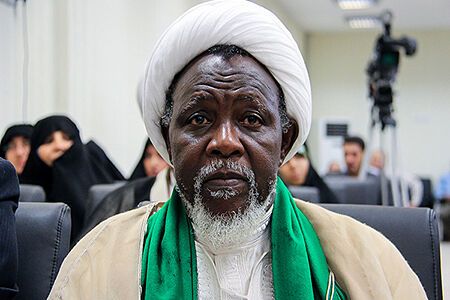
The leader of the Islamic Movement in Nigeria says Africa must draw inspiration from Iran's Islamic Revolution.

The leader of the Islamic Movement in Nigeria says Africa must draw inspiration from Iran's Islamic Revolution.
Sheikh Ibrahim Zakzaky, currently in Iran, said in a recent meeting with Alireza Araafi, the director of religious seminaries in Iran, that “the Islamic Revolution continues under the leadership of Ali Khamenei.”
During a meeting held in October, Iran's Supreme Leader Ali Khamenei conveyed to Sheikh Ibrahim Zakzaky that "The Islamic Movement is expanding in Africa, Europe, and North America," mobilizing the global Shiite population.
Zakzaky, often referred to as Nigeria's Ayatollah, leads the Islamic Movement in Nigeria, a movement inspired by the Iranian Revolution, rejecting the authority of the Nigerian government. He currently faces imprisonment on multiple charges, including murder, culpable homicide, unlawful assembly, and disruption of public peace, as the government seeks to suppress the revolutionary movement.
Expressing support for Zakzaky's efforts to expand Shiite Islam in Nigeria, where approximately 50 percent of the population is Muslim, primarily Sunni, Khamenei acknowledged Iran's backing of Nigeria's Islamic Movement. The support is evident in recent energy talks, focusing on cooperation to address energy challenges, while also seeking the Nigerian government's collaboration.
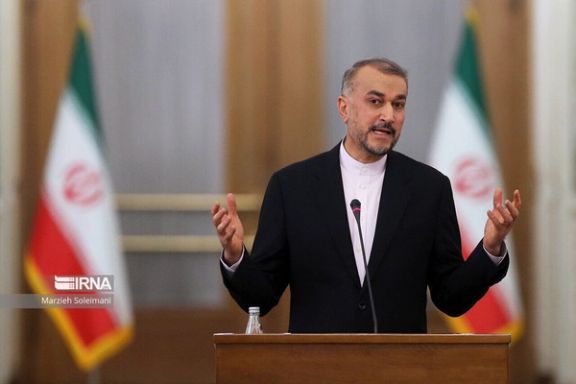
Iran's Foreign Minister criticized what he termed "coercive measures" employed by human rights institutions in their investigation of the 2022 protests.
In a meeting held in Tehran on Sunday, Hossein Amir-Abdollahian claimed that such measures “lack legal or legitimate justification".
In the wake of the unrest, the UN Human Rights Council initiated a fact-finding mission to probe the reported human rights violations in the aftermath of the widespread protests ignited in September following the death of Mahsa Amini in morality police custody.
Protesters were met with severe repression by Iranian authorities. Reports indicate the use of excessive and lethal force, over 500 killed and the arrest of tens of thousands of protesters and peaceful dissidents.
Amir-Abdollahian also claimed that a committee, led by President Ebrahim Raisi, has been established to investigate the 2022 protests. According to him, this committee signifies the "accountability and seriousness of the Islamic Republic in supporting human rights."
Human rights organizations are actively engaged in investigating the deaths of hundreds, including 69 children, during the protests. The primary focus of the investigations is to seek justice for victims and survivors of extrajudicial killings, mass arbitrary detentions, torture, and other serious abuses allegedly perpetrated by the Islamic Republic in response to peaceful demonstrations.
The lack of independence and impartiality in Iran's judicial system complicates domestic avenues for accountability, making it challenging to address alleged injustices and abuses within the country.
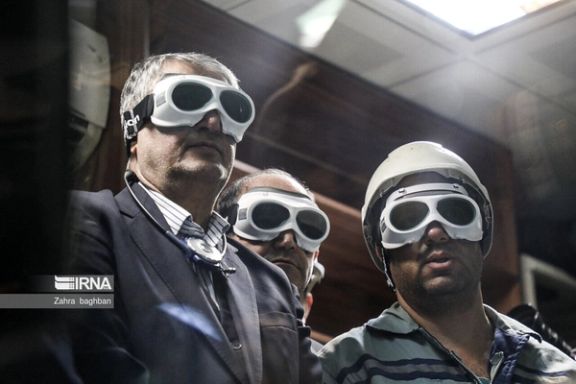
France’s ambassador to the United Nations is “extremely concerned” with Iran’s soaring uranium enrichment which he says has progressed at “dramatic rates”.
“The level of threat has increased a lot so it's time for Iran to get back to compliance and the IAEA reported on that on December 26, again, and documented the violations. So of course we are extremely concerned,” said Nicolas de Rivière in an interview with Iran International.
“We need things to go back on track and the sooner the better,” with the JCPOA nuclear agreement now collapsed. He says that the world is now at a “crossroads” as Iran violates the JCPOA nuclear agreement in “an absolutely massive manner” with enrichment at “unprecedented levels”.
The IAEA announced last week that Iran has reversed a months-long slowdown in the rate at which it is enriching uranium to up to 60% purity, close to weapons grade. While Iran already has enough uranium enriched to up to 60%, if it continues to enrich, it will have the capacity to make three nuclear bombs, and more at lower enrichment levels.
“The enrichment capacity of Iran has increased in a dramatic matter,” de Rivière said. “The so-called breakout time, which was the security deadlines provided by the JCPOA have pretty much disappeared and now Iran is pretty close to enough fissile material to assemble a nuclear device,” a situation he calls “extremely dangerous”.
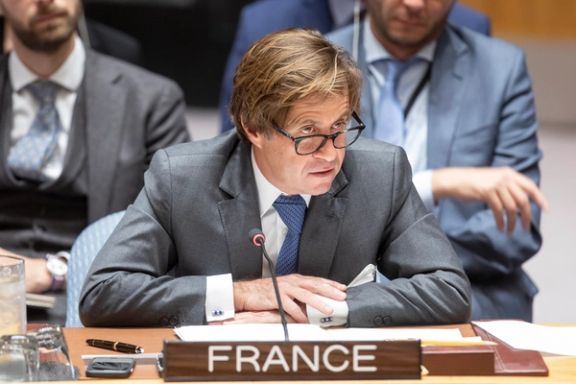
The US released a statement after the IAEA announcement which said the “findings represent a backwards step by Iran and will result in Iran tripling its monthly production rate of uranium enriched up to 60%”.
However, in keeping with the Biden administration line, the State Department said: “We remain committed to a diplomatic solution and reaffirm our determination that Iran must never develop a nuclear weapon.” Republicans believe a recent deal to free five US-Iranian hostages in return for freeing up $5bn in frozen Iranian funds has emboldened the regime.
De Rivière said the breakdown of the JCPOA and the latest revelations means “we are back to square one”. He said: “The level of the threat is extremely high and I think we should do whatever we can to convince Iran to change its course of action.”
“We should not give up with the talks. I think we should resume talks,” he said, explaining that the framework of the JCPOA itself works, but the need to resume cooperation is critical.
“We should certainly try to have another round of negotiations and see what is feasible. I think as a diplomat, you should never give up on the negotiating and trying to find a solution. So I think it's very late, but it's probably not too late.”
The E3, a coalition of the UK, France and Germany, immediately reacted to the latest IAEA news, calling it a “backwards step by Iran” which continues to deny its aims of nuclear weapons.
“The production of high-enriched uranium by Iran has no credible civilian justification and the reported production at the Fordow Fuel Enrichment Plant and the Pilot Fuel Enrichment Plant further carries significant proliferation-related risks,” the E3 said, calling the revelations “reckless behaviour in a tense regional context”.
While Iran-backed Hamas continues fighting Israel in the Gaza war, sparked by the Hamas massacre of 1,200 mostly civilians on October 7, de Rivière also spoke of the destabilizing activities of Iran’s proxies.
Its largest and most powerful proxy, Hezbollah, is also upping its attacks on Israel’s northern border, while the Yemeni Houthis have just carried out its 23rd attack on shipping in and around the Red Sea since October 19, threatening wider escalation.
The US is leading a more than 20-nation coalition to protect the maritime route, but de Rivière noted that Iran’s proxies are contributing to making the region “dangerous and unstable”.
“Whether with the Houthis or with the Iranian supported groups in Syria and Iraq, the sooner we can bring the crisis in Gaza under control the better because it will probably reduce the tensions in the whole region,” he said, France “very concerned with the risk of spillover of the crisis in Gaza in the whole region”.
France continues to warn the regime not to inflame the tensions further, de Rivière said. “We speak to the Iranians on a regular basis and this is precisely the message we put to the Iranians, don't mix up with this [Gaza] crisis.”

An Iranian hacking group, called IR Leaks, has claimed responsibility for a cyberattack on Snapp Food, the country's largest food delivery app.
The hackers boast access to the personal details of over 20 million users, exposing a vast trove of sensitive information.
The compromised data, reportedly up for sale at $30,000, includes usernames, passwords, email addresses, full names, and mobile numbers. Furthermore, the hackers claim to possess detailed information on over 51 million user addresses, complete with GPS coordinates and phone numbers.
The hackers have also released a sample of the data to validate their claims.
In an exclusive interview with the Digiato website, the hackers emphasized their decision not to inform Snapp Food's management before going public with the hack. Snapp Food, acknowledging the breach, issued a press release stating, "Initially, in collaboration with the Cyber Police, we are identifying and eliminating the source of contamination caused by the actions of this hacking group."
This is not the first time the hacking group has targeted a prominent Iranian service. In September, they reported a breach on the ride-hailing service Tapsi, affecting more than 33 million users. The hackers claimed to have engaged in negotiations with Tapsi's management for two weeks before making the breach public. However, the company refused to meet the hackers' demand of $35,000.
The recurrent nature of such incidents in Iran highlights the absence of stringent laws and penalties for negligence in safeguarding private information. The lack of user rights, including the inability to request the deletion of personal data, underscores the urgency for regulatory reforms to address the growing threat of information leaks in the country.
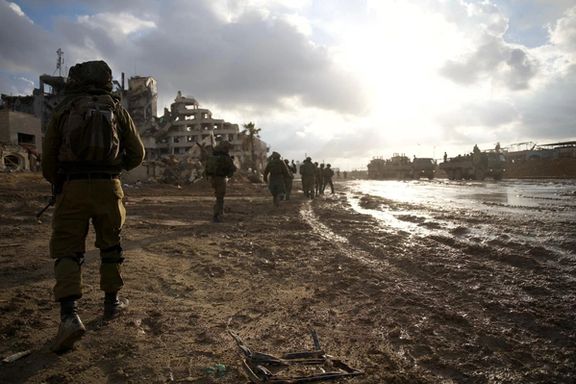
Iran’s recent decision to speed up its enrichment of uranium, and attacks by Tehran’s proxies across the region, have created deep concerns among Iranians.
Etemad Online in Tehran says tensions between Tehran and Washington have escalated following the UN nuclear watchdog, IAEA’s report about Iran’s nuclear escalation. Observers in Tehran have pointed out that the situation in the region could go dangerously out of control if there is no agreement between Tehran and Washington.
Meanwhile, according to the Wall Street Journal, Tehran's attempts to help its regional allies and proxy groups to attack Israel and US forces in the region has been a key factor in the escalation of tensions between Tehran and Washington.
Under the 2015 nuclear deal, the JCPOA, Iran’s uranium enrichment was greatly curtailed but after the United States withdrew from the accord, Tehran began to increase both the quantity and quality of its enrichment.
The boost in the production of weapons-grade uranium may also pave the way for Iran's nuclear break-away, reports say. Now, Iran has simply returned to its production level as it has been at the beginning of 2023, which means that any possible agreement between Tehran and Washington that was made since then has failed.
Meanwhile, observers in both Tehran and Washington suggest that despite these developments, Washington may still be prepared to resume the nuclear talks with Tehran although many politicians in Washington demand a tougher stance against Tehran. The resumption of the talks were initially planned for October, but the Hamas attack on Israel and the ensuing war stopped the process.
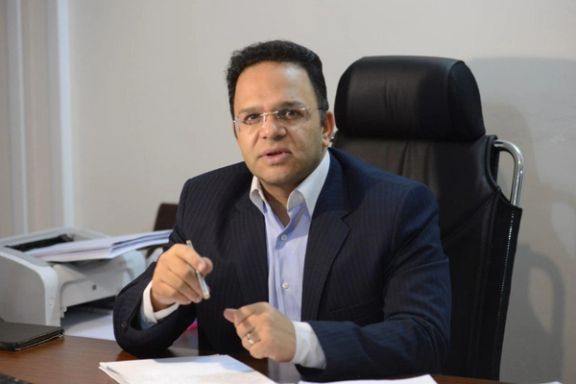
Iranian foreign policy analyst Rahman Ghahramanpour told Didban Iran website that Iran's involvement in attacks on navigation in the Red Sea is likely to lead to a confrontation in the long-run. However, even at the current level of escalation, the situation is likely to adversely affect Iran's relations with other countries such as China, Russia, and some of the regional countries that still maintain close ties with Tehran.
Ghahremanpour added that the attacks by Iran's proxies and allies on civilian shipping in the Red Sea will badly damaged its international image and foreign relations.
Meanwhile, Iran's former diplomat in New York Kourosh Ahmadi told Entekhab News website that "With no agreement between Tehran and Washington, the situation which has been under control during the past months since the start of the war in Israel, could dangerously go out of control.
Ahmadi added that it is not unlikely that Israel would plan an attack on Iran and Lebanese Hezbollah under such circumstances. However, Ahmadi quoted some unnamed Iranian officials as saying that the United States would not get involved in any new adventurism in an election year. According to Ahmadi, while such a presumption could be correct from some perspectives, it would remain true only if the opposing party could not accuse the incumbent government of weakness and indecisiveness in the face of foreign enemies. If the delicate balance were to be disrupted in such a case, the government might decide that foreign adventurism is its only way to preserve its status in the US domestic political scene.
Ahmadi also argued that events such as the recent US attack on the positions of Iranian proxy groups in Iraq could ruin the balance and the unwritten agreement between Tehran and Washington which was supposed to come out of meetings in Oman. He failed to mention that the US strikes were limited retaliation against more than 100 attacks by Iran’s proxies on US bases in Iraq and Syria.
However, Ahmadi reiterated that : "If there is no agreement between Iran and the United States, the situation that seemed to be under control during the past six months, will go out of control and a dangerous situation could take shape."
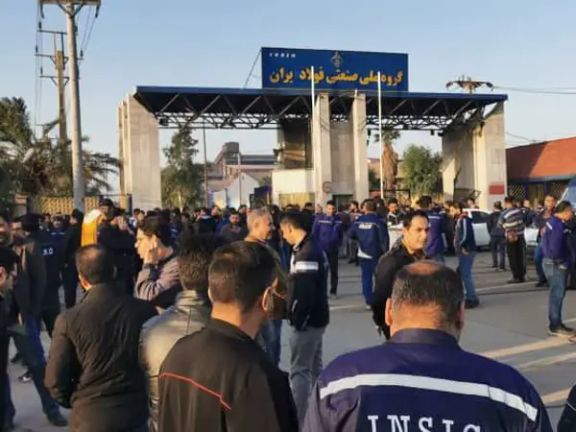
Entering its eighth consecutive day, the strike by Ahvaz National Steel Group workers has escalated as they took control of all entry and exit points of the company.
The Free Union of Iranian Workers Telegram channel reported a gathering and protest march by the workers on Saturday morning.
Videos from the eighth day of the strike depict protesting workers chanting defiant slogans refusing "to accept humiliation." In one video, a worker from Ahvaz National Steel Group declared, "Protests will persist until our demands are addressed."
The discontent in Ahvaz stems from the recent termination of 21 employees and the failure to implement job classification plans. Workers engaged with representatives from the Khuzestan province's General Department of Labor, the National Bank, and various government agencies on Thursday, as reported by the Free Union of Iranian Workers.
A published list of demands for the meeting included the "Removal of the corrupt CEO, eliminating National Bank ownership, and granting workers a role in company management." However, no outcomes have been disclosed yet. The workers also released a statement ahead of the scheduled meeting, affirming their intent to continue the strike as long as "authorities' threats and inaction persist."
On the second day of protests, an additional 17 employees faced work restrictions. The Iranian National Steel Industrial Group, once controlled by Amir Mansour Aria's investment firm, has transitioned to private ownership following legal proceedings and Aria's execution for embezzlement.
In recent months, workers across various industries, guild members, and retirees have initiated protests against the prevailing economic conditions. Unfortunately, these demonstrations have often been met with security force crackdowns.